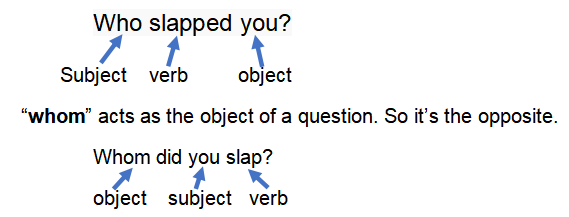WHO or WHOM – English grammar rules and lesson
This time we will be discussing the knowledge of using the words “who” and “whom”. It is important to know when to uses of “who” and “whom” to determine its correct uses and grammar rules and lesson to be aware of its difference and this lesson comes with downloadable materials and useful examples.
In this complete tutorial for beginners’ you will learn how to use “who” and “whom” in questions and in relative clauses as relative pronouns. You’ll also learn the correct position of prepositions with “who” and “whom”.
Watch the video here to have more knowledge of which to use from who or whom in sentences.
Who and whom Grammar and Uses with Examples
“Who” and “whom” are pronouns that refer to people.
In this lesson you will learn;
the use of “who” and “whom” in questions and in relative clauses.
Position of prepositions with “who” and “whom”
Important
In practice, “whom” is not used very often.
In modern English, we often replace “whom” with “who”
“who” and “whom” in questions
“who” acts as the subject of a question:
Here are who and whom uses and Example:

Important: This use of “whom” is very old and formal.
Therefore, we also use “who” as the object of a question.

“who” and “whom” in questions – More examples
Remember “who” acts as the subject of a question.
Who cooks this food?
Who is using my cellphone?
“whom” acts as the object of a question (old, very formal)
Whom did you write a letter?
Modern English: ‘who” acts as the object of a question.
Who did you write a letter?
“who” in relative clauses
The manager was angry. = main sentence
who called me = relative clause
who = relative pronoun (subject of relative clause)
“who” is referring to the manager (subject of relative clause)

“whom” in relative clauses
The manager was angry. = main sentence
whom I called = relative clause
whom = relative pronoun (object of relative clause)
“whom” is referring to the manager (object of relative clause)

In modern English, “whom” is not used, we replace it with “who”.
The manager who I called was angry.
So “who” now becomes the object of the relative clause in modern everyday English, but it still important that you know the real official grammar rule to know this but then to realize that its is not very common.
Relative clauses – More examples
“who” as a subject relative pronoun.
The boy who chased the dog is my friend.
“whom” acts as an object relative pronoun in (old and formal)
The man whom I met yesterday has invited me for dinner.
Modern English: “who” as an object relative pronoun.
The man who I met yesterday has invited me for dinner.
The relative pronoun is optional when it is the object of the clause.
So, optional means that it is not compulsory, sometimes we can choose not to use it.
Examples:
The manager whom I called was angry. ü (formal)
The manager who I called was angry. ü (modern English)
The customer I called was angry. ü
The relative pronoun is not optional when it is the subject of the clause.
Examples:
The customer who called me was angry. ü
The customer called me was angry. ×
Positions of Prepositions and the choice of “who” and “whom”.
So, we have 2 choices;
Choice 1 (very formal) so when we have the preposition, we have this form:
Preposition + “whom”
Examples:
I like the school with whom I teach.
To whom did he give the parcel?
Choice 2 (Modern, informal)
We use “who” and we put the preposition at the end of the sentence.
I like the school who I teach with.
So, in this example we have the subject “I” verb “teach” preposition “with” and the object of the preposition actually goes before it “who” so it’s quiet a strange order of words but this is how we say it in modern English.
Who did he give the parcel to?
So, we have “who” and then “did he give the parcel to”, “he” is the subject, “give” is the verb, here we have the preposition “to” right at the end of the sentence and we have the object of the preposition here “who” at the beginning of the sentence.
Those are the 2 choices that you’ve with the prepositions who or whom.
Downloadable Material
Here’s the downloadable material of Tutorial on when to use WHO or WHOM – English grammar rules and lesson here.
For more readings
- FAIL – 5 different meanings + expression
- The difference between “a little” and “little”
- Matter – English noun, verb and expressions
- When to use “a little” and “a few”: English Grammar Rules
- Compound Words: English Vocabulary
- The difference between MUST and HAVE TO
If you have any questions or suggestions about WHO or WHOM – English grammar rules and lesson, please feel free to leave a comment below or send us a message using our contact page.


